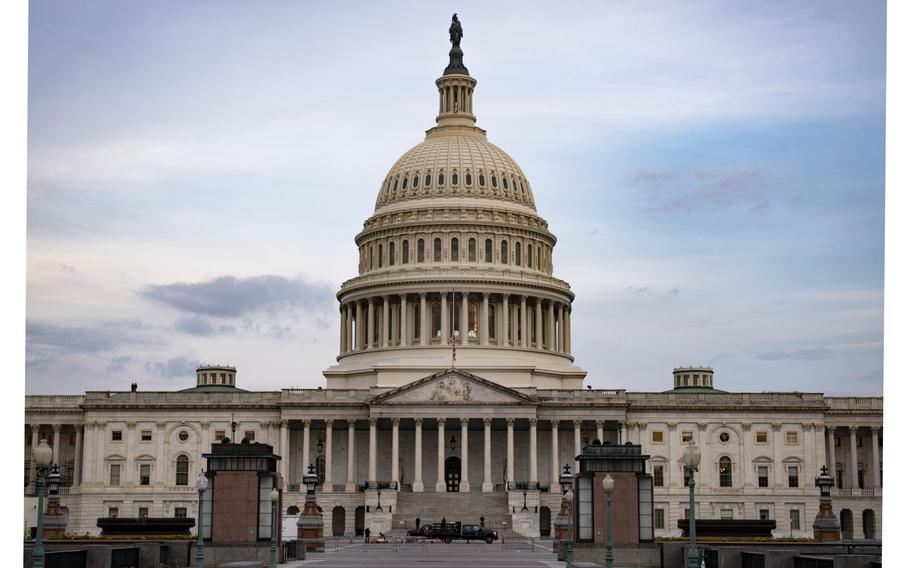
The U.S. Capitol is seen on July 6, 2022, in Washington, D.C. (Carlos Bongioanni/Stars and Stripes)
WASHINGTON — A House appropriations panel advanced a spending bill Wednesday for the Department of Veterans Affairs that Republicans touted as proof of their commitment to veterans but Democrats dismissed as an empty promise.
The House Appropriations Committee's VA and military construction subcommittee agreed to move the legislation to the full committee over the loud objections of Democrats who say the Republican-led plan does not fully fund toxic exposure benefits.
Republicans, in turn, argued their bill supports fiscal responsibility while still meeting the Biden administration’s $143 billion budget request for the VA for fiscal 2024, which begins Oct. 1.
“We kept our promise, and we did it responsibly,” said Rep. John Carter, R-Texas, chairman of the subpanel.
The bill is the latest showdown between House Republicans and Democrats over funding for veterans health care and benefits following the passage of a controversial measure last month to raise the debt ceiling in exchange for slashing federal spending.
Democrats, the VA and veterans groups criticized the Republican proposal for failing to carve out protections for spending on veterans and said it would result in a 22% budget cut to the VA.
Rep. Debbie Wasserman Schultz, the top Democrat on the VA appropriations subcommittee, accused Republicans on Wednesday of continuing a “disturbing trend” of underfunding veteran services.
“I cannot in good conscience support this bill, and it saddens me,” the Florida congresswoman said. “I’ve been in a leadership role on this subcommittee since 2014, and I have never felt more sickened and sad about the product that we are producing today.”
The main point of contention is the Toxic Exposures Fund, a dedicated reserve set up by last year’s sweeping Promise to Address Comprehensive Toxics, or PACT, Act to cover the treatment costs of veterans exposed to burn pit smoke and other toxins. The fund is considered mandatory spending and is not subject to the annual congressional spending process.
The Republican spending bill proposes putting $5.5 billion into the fund — nearly $15 billion less than the VA requested — and supplementing the difference with discretionary spending that can be adjusted annually.
Democrats said Wednesday that the move breaks the promise made to veterans under the PACT Act to guarantee health care and benefits and puts the fund at the mercy of future political fights.
“The Republicans in Congress are now proposing we toss that guarantee in the garbage and put funding at risk on an annual basis,” said Rep. Rosa DeLauro of California, the top Democrat on the House Appropriations Committee. “That goes beyond morally reprehensible, it is just plain cruel.”
Carter said Republicans “did not accept” the “shift” of nearly $15 billion to the mandatory side of the budget.
“We utilized the Toxic Exposure Fund as intended: to cover the incremental costs above the fiscal year 2021 baseline to implement the PACT Act,” he said.
Democrats said Republicans were also seeking to remove dedicated funding for military installation climate change and resilience projects, oversight of privatized housing and the cleanup of toxic PFAS, or per- and polyfluoroalkyl substances.
They slammed the bill for failing to provide adequate funding for military construction though the bill proposes spending $1 billion more on barracks and other facilities than the $17 billion that the White House had requested.
Committee chairwoman Kay Granger, R-Texas, said the Republicans’ budget plan, the first of 12 appropriations bills that will be introduced by the House committee in the next few weeks, demonstrates “how we’re able to reduce overall spending without impacting our committee commitment to veterans, national defense and homeland security.”
In addition to budgeting, the bill advances a conservative agenda that takes aim at several liberal initiatives. It includes a ban on implementing executive orders on diversity, equity and inclusion and prohibits the use of funds to promote or advance critical race theory, which examines structural racism and inequality.
The bill also notably eliminates funding for the VA’s public affairs office in response to what Republicans described as “inaccurate and politically motivated press releases making false claims about budget cuts.”
More than 50 House Republicans lashed out at the VA earlier this month for publicizing the potential impact to veterans of a debt ceiling bill that returns federal spending to 2022 levels. The bill narrowly passed the Republican-led House but lacks support in the Democrat-led Senate. The VA budgeting bill in its current form is also unlikely to gain traction in the upper chamber.